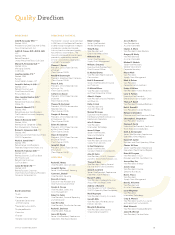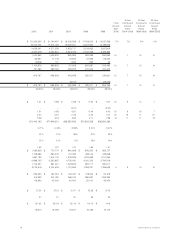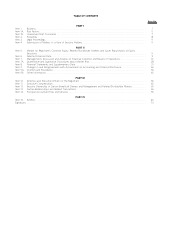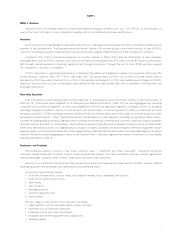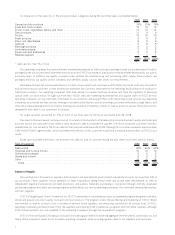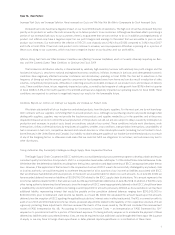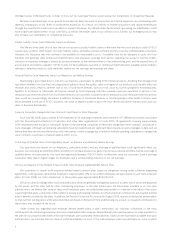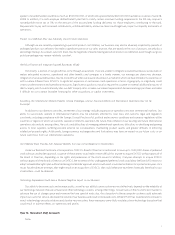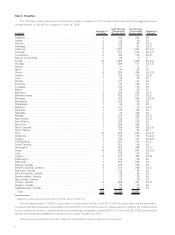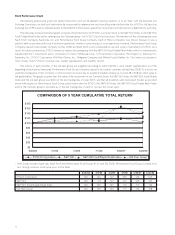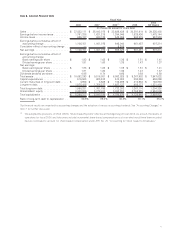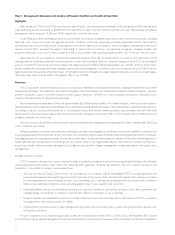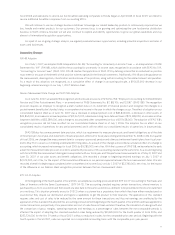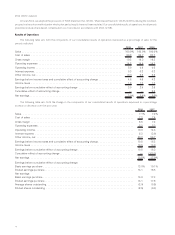Sysco 2008 Annual Report Download - page 28
Download and view the complete annual report
Please find page 28 of the 2008 Sysco annual report below. You can navigate through the pages in the report by either clicking on the pages listed below, or by using the keyword search tool below to find specific information within the annual report.advantages include our diversified product base, the diversity in the types of customers we serve, our economies of scale and our wide geographic
presence in the United States and Canada, which allows us to minimize the impact of regional economic declines. We are the only publicly-traded
distributor in the “food-prepared-away-from-home” industry in the United States. While our public company status provides us with some
advantages, including access to capital, we believe it also provides us with some disadvantages that our competitors do not have in terms of
additional costs related to complying with regulatory requirements.
Government Regulation
As a marketer and distributor of food products, we are subject to a number of statutes governing the manufacture, storage, transport,
and sale of food products in the United States and Canada. The principal statutes are the U.S. Federal Food, Drug and Cosmetic Act and
regulations promulgated thereunder by the U.S. Food and Drug Administration (FDA), as well as the Canadian Food and Drugs Act and the
regulations thereunder.
The FDA regulates manufacturing and holding requirements for foods through its manufacturing practice regulations, specifies the
standards of identity for certain foods and prescribes the format and content of certain information required to appear on food product
labels. For certain product lines, we are also subject to the Federal Meat Inspection Act, the Poultry Products Inspection Act, the Perishable
Agricultural Commodities Act, the Packers and Stockyard Act and regulations promulgated thereunder by the U.S. Department of
Agriculture (USDA). The USDA imposes standards for product quality and sanitation including the inspection and labeling of meat and
poultry products and the grading and commercial acceptance of produce shipments from our suppliers. We are also subject to the Federal
Trade Commission Act, which governs food advertising and the Public Health Security and Bioterrorism Preparedness and Response Act of
2002 and the regulations promulgated thereunder, which establish certain registration, import notification and record keeping requirements
on facilities that manufacture, process, pack or hold food for human or animal consumption.
In Canada, the Canadian Food Inspection Agency administers and enforces the food safety and nutritional quality standards established
by Health Canada under the Canadian Food and Drugs Act and under other related federal legislation, including the Canada Agricultural
Products Act, the Meat Inspection Act, the Fish Inspection Act and the Consumer Packaging and Labeling Act (as it relates to food). These
laws regulate the processing, storing, grading, packaging, marking, transporting and inspection of certain SYSCO product lines as well as the
packaging, labeling, sale, importation and advertising of pre-packaged and certain other products.
We and our products are also subject to state, provincial and local regulation through such measures as the licensing of our facilities;
enforcement by state, provincial and local health agencies of state, provincial and local standards for our products; and regulation of our
trade practices in connection with the sale of our products. Our facilities are subject to inspections by FDA and USDA, as well as inspections
and regulations issued pursuant to the U.S. Occupational Safety and Health Act by the U.S. Department of Labor, together with similar
occupational health and safety laws in each Canadian province. These regulations require us to comply with certain manufacturing, health
and safety standards to protect our employees from accidents and to establish hazard communication programs to transmit information on
the hazards of certain chemicals present in products we distribute.
We are also subject to regulation by numerous U.S. and Canadian federal, state, provincial and local regulatory agencies, including, but
not limited to, the U.S. Equal Employment Opportunity Commission, the U.S. Department of Labor and each Canadian provincial ministry of
labour, which set employment practice standards for workers, and the U.S. Department of Transportation and the Canadian Transportation
Agency, which regulate transportation of perishable and hazardous materials and waste, and similar state, provincial and local agencies.
Most of our distribution facilities have ammonia-based refrigeration systems and tanks for the storage of diesel fuel and other
petroleum products which are subject to laws regulating such systems and storage tanks, as well as laws regulating the handling and release
of these substances. Our facilities also have large areas of impermeable surface for parking and staging of vehicles and therefore are
potentially subject to federal, state, provincial and local laws and regulations covering storm water run-off. Other U.S. and Canadian federal,
state, provincial and local provisions relating to the protection of the environment or the discharge of materials do not materially impact the
use or operation of our facilities.
Compliance with these laws has not had, and is not anticipated to have, a material effect on our capital expenditures, earnings or
competitive position.
General
We have numerous trademarks which are of significant importance to the company. We believe that the loss of the SYSCO(R)
trademark would have a material adverse effect on our results of operations.
We are not engaged in material research and development activities relating to the development of new products or the improvement
of existing products.
Our sales do not generally fluctuate significantly on a seasonal basis; therefore, the business of the company is not deemed to be
seasonal.
As of June 28, 2008, we operated 180 distribution facilities throughout the United States and Canada.
4


